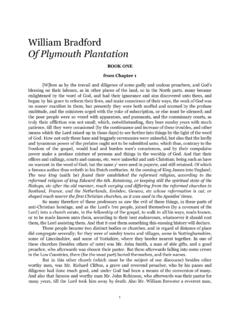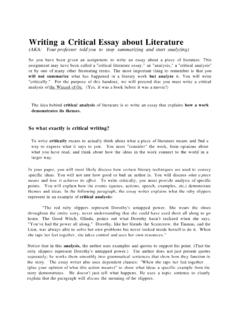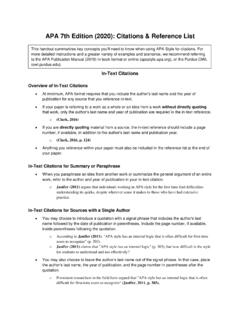Transcription of Of Plymouth Plantation - Dutchess Community College
1 1 William Bradford Of Plymouth Plantation BOOK ONE from Chapter 1 [W]hen as by the travail and diligence of some godly and zealous preachers, and God s blessing on their labors, as in other places of the land, so in the North parts, many became enlightened by the word of God, and had their ignorance and sins discovered unto them, and began by his grace to reform their lives, and make conscience of their ways, the work of God was no sooner manifest in them, but presently they were both scoffed and scorned by the profane multitude, and the ministers urged with the yoke of subscription, or else must be silenced; and the poor people were so vexed with apparitors, and pursuivants, and the commissary courts, as truly their affliction was not small.
2 Which, notwithstanding, they bore sundry years with much patience, till they were occasioned (by the continuance and increase of these troubles, and other means which the Lord raised up in those days) to see further into things by the light of the word of God. How not only these base and beggarly ceremonies were unlawful, but also that the lordly and tyrannous power of the prelates ought not to be submitted unto; which thus, contrary to the freedom of the gospel, would load and burden men s consciences, and by their compulsive power make a profane mixture of persons and things in the worship of God.
3 And that their offices and callings, courts and canons, etc. were unlawful and anti-Christian; being such as have no warrant in the word of God; but the same that were used in popery, and still retained. Of which a famous author thus writeth in his Dutch commentaries. At the coming of King James into England; The new king (saith he) found their established the reformed religion, according to the reformed religion of king Edward VI. Retaining, or keeping still the spiritual state of the Bishops, etc. after the old manner, much varying and differing from the reformed churches in Scotland, France, and the Netherlands, Embden, Geneva, etc.
4 Whose reformation is cut, or shaped much nearer the first Christian churches, as it was used in the Apostles times. So many therefore of these professors as saw the evil of these things, in these parts of anti-Christian bondage, and as the Lord s free people, joined themselves (by a covenant of the Lord) into a church estate, in the fellowship of the gospel, to walk in all his ways, made known, or to be made known unto them, according to their best endeavours, whatsoever it should cost them, the Lord assisting them.
5 And that it cost them something this ensuing history will declare. These people became two distinct bodies or churches, and in regard of distance of place did congregate severally; for they were of sundry towns and villages, some in Nottinghamshire, some of Lincolnshire, and some of Yorkshire, where they border nearest together. In one of these churches (besides others of note) was Mr. John Smith, a man of able gifts, and a good preacher, who afterwards was chosen their pastor. But these afterwards falling into some errors in the Low Countries, there (for the most part) buried themselves, and their names.
6 But in this other church (which must be the subject of our discourse) besides other worthy men, was Mr. Richard Clifton, a grave and reverend preacher, who by his panes and diligence had done much good, and under God had been a means of the conversion of many. And also that famous and worthy man Mr. John Robinson, who afterwards was their pastor for many years, till the Lord took him away by death. Also Mr. William Brewster a reverent man, who afterwards was chosen an elder of the church and lived with them till old age.
7 2 But after these things they could not long continue in any peaceable condition, but were hunted and persecuted on every side, so as their former afflictions were but as flea-bitings in comparison of these which now came upon them. For some were taken and clapped up in prison, others had their houses beset and watched night and day, and hardly escaped their hands; and the most were fain to fly and leave their houses and habitations, and the means of their livelihood. Yet these and many other sharper things which afterward befell them, were no other then they looked for, and therefore were the better prepared to bear them by the assistance of God s grace and spirit.
8 Yet seeing themselves thus molested, and that there was no hope of their continuance there, by a joint consent they resolved to go into the Low-Countries, where they heard was freedom of Religion for all men; as also how sundry from London, and other parts of the land, had been exiled and persecuted for the same cause, and were gone thither, and lived at Amsterdam, and in other places of the land. So after they had continued together about a year, and kept their meetings every Sabbath in one place or other, exercising the worship of God amongst themselves, notwithstanding all the diligence and malice of their adversaries, they seeing they could no longer continue in this condition, they resolved to get over into Holland as they could; which was in the years 1607 and 1608.
9 ; of which more at large in the next chapter. Chapter 4 Showing the reasons and causes of their removal. After they had lived in this city about some 11 or 12 years, (which is the more observable being the whole time of that famous truce between that state and the Spaniards,) and sundry of them were taken away by death, and many others began to be well stricken in years, the grave Mistress Experience having taught them many things, those prudent governors with sundry of the sagest members began both deeply to apprehend their present dangers, and wisely to foresee the future, and thine of timely remedy.
10 In the agitation of their thoughts, and much discourse of things hear about, at length they began to incline to this conclusion, of removal to some other place. Not out of any newfangledness, or other such like giddy humor, by which men are oftentimes transported to their great hurt and danger, but for sundry weighty and solid reasons; some of the chief of which I will hear briefly touch. And first, they saw and found by experience the hardness of the place and country to be such, as few in comparison would come to them, and fewer that would bide it out, and continue with them.








